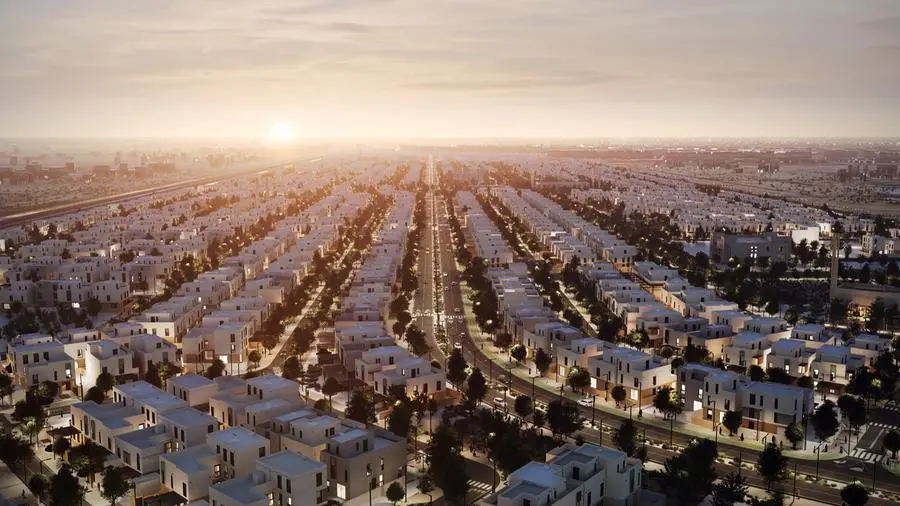How to Invest in Real Estate in Saudi Arabia
True to Crown Prince Mohammed bin Salman, Saudi Arabia is turning out to be one of the biggest success stories of the 21st century. These are ambitious and transformational efforts that have actually put the kingdom on the path of reducing its reliance on the lucrative oil business and shifting focus onto other sectors. One of those areas that has experienced deep growth and transformation has been real estate, as part of the Kingdom's Vision 2030 plan.
The residential real estate segment is projected to grow from $187.20 billion as of 2024 to $284.90 billion by 2029. It adds to the 8.77% compound annual growth rate, further underlining Saudi Arabia as one of the leading global investment destinations. The crown Prince has set out to increase the real estate sector's contribution to GDP from 5% to 10%. Real estate and infrastructure projects valued at $1.25 trillion, plans for the building of over 240,000 homes are expected to strengthen the sector by an extra $229 billion.
So, among these huge investments, Saudi Arabia should keep on presenting a diverse range of investment opportunities in real estate, which suits any style of investment portfolio. Along similar lines, the level of real estate transactions in terms of value has been on the rise amid the growing demand. This represents an uptick of over two billion dollars from the period transactions of 2017-2023 and, going forward, will increase year over year until 13.74 billion dollars by 2028.

Source: Statista
Whether investing in luxury villas in Riyadh, a modern apartment in Jeddah, or a high-yield rental property in Dammam, one will always be spoilt for choice in the nascent yet burgeoning Saudi Arabia real estate sector.
Why Invest in Real Estate in Saudi Arabia
While Saudi Arabia's economy contracted in 2023, the 0.8% drop in real GDP was due to the 9% contraction in the oil sector due to oil production cuts under the OPEC agreement. Nevertheless, the non-oil sector, including real estate, remains a bright spot, having grown by 3.8%, ending the year on a strong footing.
Over the next five years, the economy is expected to grow by 14%, affirming its status as one of the top investment hubs for institutional investors across various sectors.

Source: Sandsofwealth
A population boost of 2% to 3% is also seen as a boost to Saudi Arabia's real estate sector, expected to continue fuelling demand for commercial and residential properties. A decline in interest rates is also seen as a catalyst that should offer much-needed support to the mortgage sector after a 35% drop last year.
Saudi Arabia has become a top tourist destination, with tourists and expatriates flocking. Likewise, property demand has continued to grow, with the value of real estate transactions experiencing a 25% increase last year.
Introducing a new visa regime that encourages foreign real estate ownership also stimulates demand and construction of new projects. The influx of foreign investment into real estate is one of the reasons the sector is on course to witness a 62% growth over the next four years and reach over $100 billion by 2027, according to a study by RedSeer Strategy.
Due to the booming energy sector, the country's affluent demographic continues to fuel demand for luxury and high-end properties in some of the big cities. Similarly, there is a growing demand for affordable housing among citizens and migrants flocking to the country to work in various sectors.
Investing in Real Estate in Saudi Arabia
Investing in Saudi Arabia's real estate offers various options, from residential properties to commercial spaces and land. Depending on location, regulations, and costs, it's also possible to build a new property. The average cost of residential properties varies depending on the city one is in. For instance, the average price of properties in major cities like Riyadh and Jeddah can vary between SAR 4,000 ($1066) and SAR 6,000 ($1600) per square meter. Luxury properties can cost much more.

Source: Sandsofwealth
The rental yield potential is one of the highest in the region, with property owners enjoying yields of up to 8% depending on the property type, location, and market conditions. Nevertheless, markets such as Isfahan, Manama, and Dubai offer high rental yields of more than 10%.
The yields are expected to increase as rental demand remains high due to the growing population and the country emerging as a top tourist destination.

Source: Sandsofwealth
In addition to rental returns, there is always a prospect of generating much higher returns when selling a property. In thriving urban settings, one can enjoy annual property appreciation of up to 6%, which translates to higher returns when selling.
It's common for foreigners to gravitate towards various cities when looking to invest in Saudi Arabia's real estate market. Business professionals are fond of major cities like Riyadh and Jeddah, while religious people focus on cities like Mecca and Medina.
For people looking for budget-friendly cities with growth prospects, Dammam and Al Khobar offer some of the best opportunities. These cities stand out as they blend modern living with affordability.
Nevertheless, investing in properties in Saudi Arabia comes with distinct rules and restrictions for foreigners. For starters, foreigners can own land, but it is limited to specific areas and purposes. In this case, one can only buy land or property in gazette residential and commercial zones. Additionally, foreign real estate ownership can be at most 20% in a given area or city.
On the other hand, you don't need to live in the country to purchase and own property in the kingdom. Nevertheless, having a residence permit can simplify and hasten real estate investment. However, foreigners must obtain approval from the Ministry of Investment to acquire property in the kingdom required for their professional or economic activities. Likewise, foreigners can also own residential properties upon acquiring a license from the Ministry of Interior.
Some of the stringent regulations for property ownership in Saudi Arabia include the following:
- Foreign ownership is limited to residents with an Iqama license
- Ownership of property in holy cities like Madina and Makkah is prohibited unless one gets usufruct rights for 99 years
- The property size cannot exceed 3,000 square meters per foreigner
- Only one property per foreigner
Some of the documents that one must have in hand to simplify the process of owning properties in the country include the following:
- Tax ID
- Passport
- Visa or residence permit
- Proof of income
Step by step Process of buying property in Saudi Arabia
Step 1: Explore the Best City to Invest in
Saudi Arabia is a massive country with different cities offering unique real estate investment opportunities. While investing in the real estate sector, exploring other towns and what they stand for is essential. With such an investment opportunity in sight, asset management firms would certainly ensure that they are pointing at markets that offer the right kind of environment for their investments and that underscore the expertise and market insight that they bring to foreign investors.
Concerning this condition, Riyadh, the capital and the largest city, provides the best chance for this type of investment. Al Olaya, the Diplomatic Quarter, and AL Nakheel are the best areas. Some of the prime locations to invest in residential property for rental income in Riyadh include Al Olaya, referred to as a business hub, Al Nakhil, an ideal location for family houses, and Al Malaz, best known for its plethora of entertainment options.
Jeddah is another vital city to consider. It is an important port city and commercial center of the Red Sea. It is a top tourist destination known for its vibrant culture, diverse expatriate community, and proximity to Mecca. The best areas to consider include Al Hamra, Al Andalus, and AL Rawadh. The top cities acting as economic and cultural zones have driven Saudi Arabia's sector push to surpass the $2 trillion level, with residential real estate accounting for about $1.39 trillion.
The complex landscape of real estate investment in Saudi Arabia underscores the value of partnering with an asset management firm. Such firms offer unparalleled access to current and future real estate funds, alongside their deep market knowledge, making direct investment processes more manageable for foreign investors.
Step 2: Engage the Services of Local Agents
While hiring a lawyer, notary, or local agent is not mandatory in the kingdom's property-buying process, it is crucial. Engaging the services of an asset management firm is especially beneficial for foreigners looking to navigate the complexities of the Saudi real estate market.
Experts make the investment process easier by providing invaluable insight into cities that promise the best investments and properties for sale.
Indeed, asset management firms help foreign investors with every challenge related to legal frameworks, cultural differences, and regulatory requirements. They ensure due diligence in the valuation and inspection of property for the fair value of the investments.
Some of the key pitfalls and risks to be aware of include the following:
- The security of property rights is still a hot subject in the kingdom, as bureaucratic processes can be intricate for foreigners. The kingdom is still working on improving the legal frameworks to protect property owners.
- Cultural and regulatory differences are also sure to get many foreigners off-guard. For instance, there are regulations regarding land use and development that one should be aware of before investing
- The White Land Tax on undeveloped urban land is another significant risk that one should be aware of as it can affect investment strategies
- Environmental risks such as flooding, earthquakes, extreme heat, or water scarcity should also be taken into consideration
Foreign investors can mitigate the risks by conducting thorough research and engaging the services of local experts before investing.
Step 3: Property Search
Conducting due diligence is simplified with the support of an asset management firm, offering a streamlined path to verifying ownership and ensuring structural integrity. This professional assistance is critical in a market like Saudi Arabia, where foreign investors face unique challenges.
The expertise of an asset management firm in navigating government channels and regulatory landscapes further emphasizes the benefits of their involvement in the investment process, offering a smoother, more informed investment journey for foreign investors.
Some of the official government channels that one can rely on for valuable information on real estate investment in Saudi Arabia include:
- mewa.gov.samewa.gov.sa: For investment opportunities
- Momrah.govMomrah.gov: For real estate development certificates and grants
- My.gov.saMy.gov.sa: For land and real estate searches and title registration
Step 4: Placing an Offer
Once a local agent carries out property valuation, one can start negotiations. There is usually room to negotiate on the selling price and the amount of discount to get before placing an offer. The negotiation process will always vary and depend on the property's location and market conditions. Usually, one can get a discount of 5% and 10% off the listed price.
Once an offer is made and accepted, a formal sales agreement outlining the terms and conditions of the sale, including the price payment plan and other relevant details, must be drafted.
Step 5: Actual Purchase Process
The actual purchase process entails transferring ownership through deed transfer. With the help of a local agent, one must engage a notary or legal representative to ensure that all documents check out and are correctly processed to make them legally binding.
The entire process of finding and obtaining ownership of real estate property in Saudi Arabia can take months, depending on various factors, from financial arrangements to legal verifications and bureaucratic processes.
Once all the documents are checked out and signed by both the seller and buyer, the transfer process of property ownership can be finalized and recorded with the government through the Ministry of Justice. In this case, all the documents must be submitted, and all payments must be made.In conclusion, the complexities and challenges presented by the steps above can be effectively navigated and overcome through partnership with a seasoned and experienced asset management firm. This strategic collaboration offers investors a guided, informed, and streamlined path to successful real estate investment.
Conditions for Real Estate Investment in Saudi Arabia
Foreigners must meet various requirements to buy and sell property in Saudi Arabia. Some of the requirements include:
- Government Permission: Foreigners must apply and register with relevant authorities to purchase property. The process involves supplying documents that prove the buyer's identity, source of funds, and purpose.
- Tax and Fee Restrictions: Foreigners must pay property taxes and transfer fees. However, the kingdom has sought to enhance real estate investments by reducing Real Estate Transaction Tax from 15% to 5% per transaction.
- Residential or Commercial Use: There might be a minimum investment value when investing in residential properties. In some cases, foreigners must have a minimum of 30 million Saudi Riyals to invest in the property market. Foreigners must demonstrate a clear business plan or partner with Saudi investors for commercial use.
- Property Type and Location: Foreigners can only invest in properties in urban or tourist areas. Purchasing property designated for agricultural purposes or close security installations is impossible.
- Financing: Saudi banks can offer financing for real estate investments to foreigners under different conditions. Banks provide 97% of real estate investment loans. Last year alone, the banks offered prospective investors over $200 billion in loans.
Bottom Line
All the above, make Saudi Arabia a premier location for real estate investments amidst a burgeoning population, rapid urbanization, and the ambitious Vision 2030 that draws in diversification of the country's economy away from oil.
With over $1 trillion in funds for radical infrastructure projects, the kingdom is improving its infrastructure to the level homeowners will buy, and institutional investors can find it attractive. All of this added to the friendly and beautiful environment and increased the demand for the purchase or rental of residential and commercial properties while strategically developing economic cities and special zones for investors eyeing to tread this promising landscape efficiently and maximize returns, partnering with a seasoned and experienced asset management firm becomes an invaluable strategy.
Thus, this would ensure easy investment and their ability to access premier real estate opportunities within the flourishing market of Saudi Arabia.


















